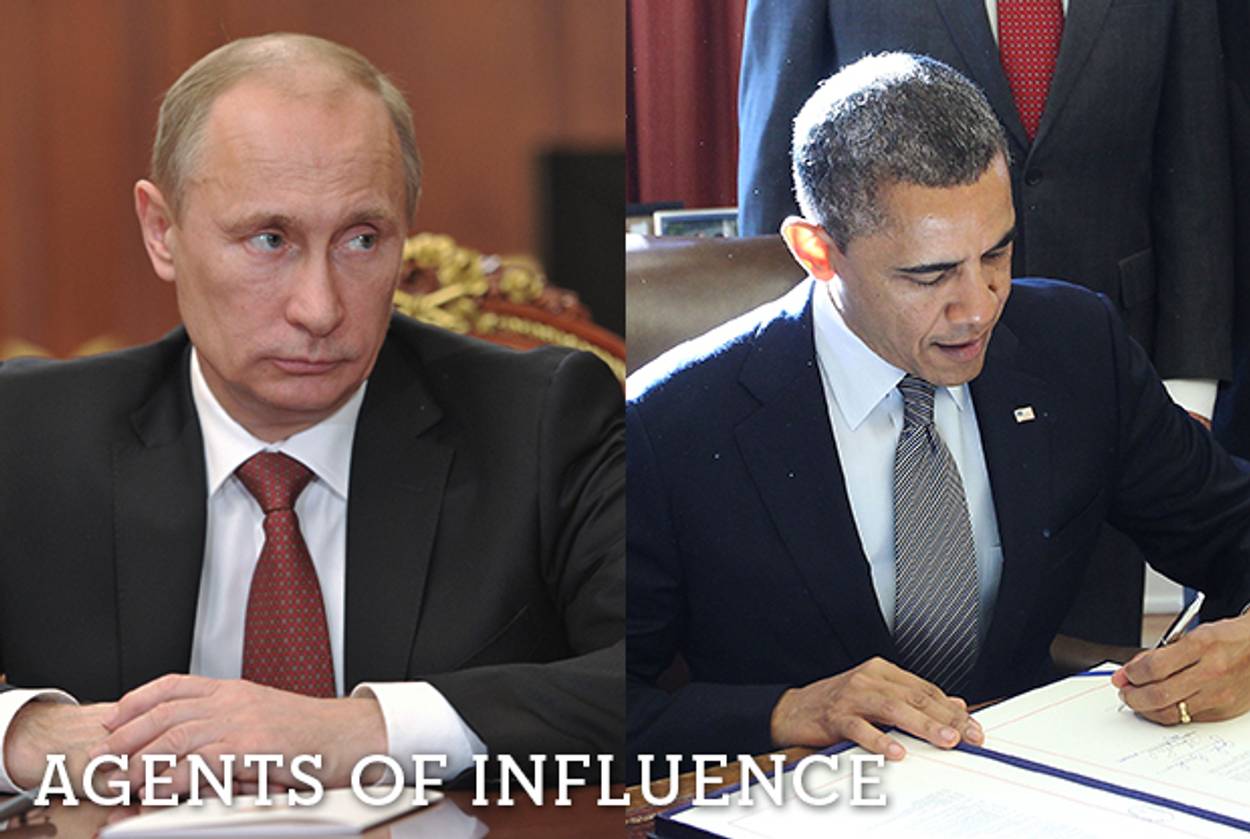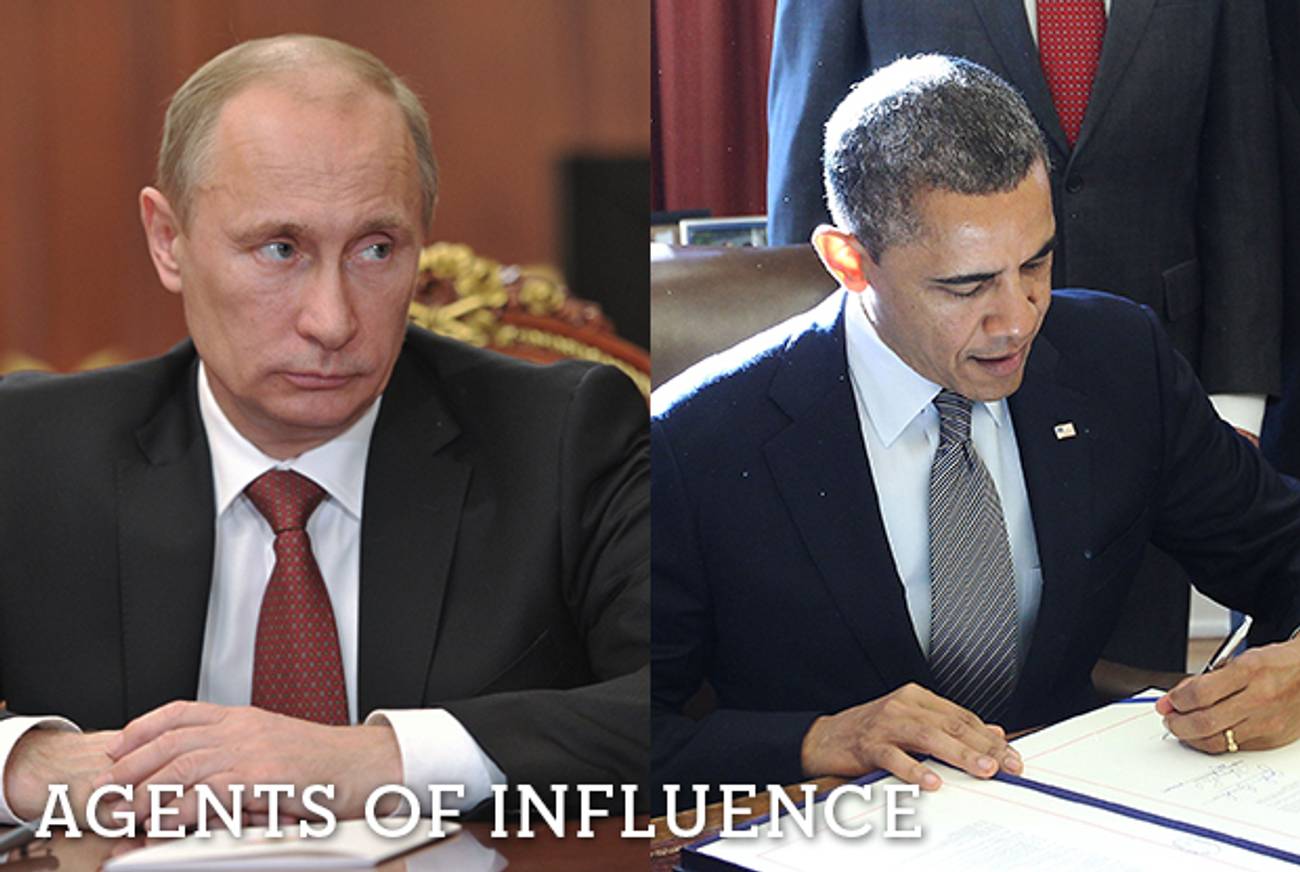Russia, Wannabe Superpower
Will Putin’s ban on adoptions finally help U.S. officials grasp the nature of Russia’s political leadership?




Maybe Mitt Romney was right. The failed Republican presidential candidate got ripped during the campaign when he called Russia our “No. 1 geopolitical foe,” but he seems to have had a clearer picture of the country than President Obama, who was famously overheard promising then-President Dmitri Medvedev more “flexibility” regarding missile defense and other issues after the election. “I will transmit this message to Vladimir,” said Medvedev, referring to Putin, the man who just last week signed a law forbidding Americans from adopting Russian children.
The legislation was apparently enacted as revenge for a U.S. law targeting Russian officials involved in the 2009 death of Russian anti-corruption whistleblower Sergei Magnitsky. But given that Russia regularly jails nonviolent dissidents, systematically violates the human rights of its own citizens, and writes anti-gay legislation, their vindictive move on adoptions should come as little surprise. It says something about the nature of Russian society that the orphans of a country rich with petrodollars should have to look elsewhere for loving parents—and that, when they find them abroad, the Kremlin would still find a way to stamp out their hope.
What’s strange is that even though Obama Administration officials have criticized Moscow on a range of different issues, they nonetheless seem unable to grasp what this characteristic disregard of Russian citizens says about the fundamental nature of Russia’s political leadership. To be sure, State Department spokesmen condemned “the Russian government’s politically motivated decision” on the adoption ban. But that same State Department is keen to work with the Kremlin on all sorts of geopolitical matters, from Iran to Afghanistan and perhaps most notably in bringing an end to the Syrian civil war, recently working with Russia to back a U.N.-sponsored peace plan. Indeed, ever since Obama declared in August 2011 that Bashar al-Assad should step down, the United States has sought to convince Putin to help topple the Syrian tyrant.
But see it from the perspective of Russia’s tyrant: If the U.S. president is not willing to put any skin in the game, why should the Americans get a cheap victory on Syria? Plus, it costs Russia little to obstruct. The Russians, as they’ve shown in Syria and with the adoption ban, are indifferent to international opprobrium—and besides, everyone comes back eventually to ask them for something, even the Americans. It’s almost enough to make the Russians feel they’re still a superpower.
***
The fall of the Soviet Union marked what many in Washington hoped was the beginning of a beautiful relationship. The end of the Cold War, according to Mikhail Gorbachev and George H.W. Bush, had ushered in a “new world order.” Almost five decades of superpower conflict fought via proxies on four continents had come to an end. It’s noteworthy that 1 million Jews bet their lives against this new world order by fleeing Russia for Israel; they apparently understood that there would be no new Russia.
And yet American policymakers, journalists, and academics have deluded themselves for 20 years about a society where the men suffer from widespread alcoholism and many women are trafficked abroad as sex workers. George W. Bush said he looked into the eyes of Putin and saw his soul, perhaps imagining that he was conversing with a character from a Turgenev story rather than a man schooled by the most brutal clandestine service in modern history.
Now it seems it is Obama who has fooled himself. For a year and a half Vladimir Putin has made it abundantly clear that, no matter how many times U.N. Ambassador Susan Rice expresses outrage when Moscow vetoes stronger resolutions against Assad, he is not going to break with the Syrian president. The new U.N. plan, for starters, would leave Assad in power at least until 2014. In attempting to partner with a Kremlin that has entirely different objectives, either the White House is obtuse or, as some have argued, cynical. As Tony Badran, research fellow at the Foundation for Defense of Democracies, wrote regarding Syria, “Talking to the Russians enabled the [Obama] administration to maintain the pretense of meaningful diplomatic activity, all while allowing it to blame the lack of any breakthrough on Moscow.”
The question is: Why are the Russians refusing to budge? What stake does Moscow have in sticking with Assad until the bitter end? Russia has no vital interests in Syria. Damascus has been a major customer for Russian arms for more than four decades but has paid only a fraction of what it owes for those weapons. As for Russia’s so-called naval base in Tartus, in fact it is little more than a refueling station with a staff of four people.
Some analysts argue that Moscow is still angry at the United States, France, and Britain for over-reaching with its U.N. security council resolution, meant to protect Libyan innocents, by using it to depose Muammar Qaddafi in October 2011. Putin, this argument goes, now fears that the United States is getting regime-change happy and may come for him next. But this doesn’t hold up: As the Russians themselves acknowledged with their 2008 invasion of Georgia , U.N. security council resolutions don’t crush governments; armies do.
Others claim that Moscow is terrified of the rise of the Islamists throughout the Middle East. It’s true that the Russians are worried about their own Islamist problem—the Chechen rebels that have often taken the war to Moscow itself. And there are reports of Chechen fighters scattered among different Syrian rebel units. But the notion that Putin is more generally worried about the rise of radical Islam is nonsense. After all, by supporting Assad, Putin has aligned himself with Iran and Hezbollah, the most dangerous radical Islamist bloc and the one that, unlike the Salafists and Muslim Brotherhood, is marching toward a nuclear weapons program.
So, what’s the problem? It runs deeper than Putin. After the dissolution of the Soviet empire, American academics counseled Russian leaders on how they might best transform a command economy into a free-market system. And yet as the Mafia-fication of Russian enterprise showed in the 1990s, the problem was not then, and is not now, the Russian financial system. To turn a Marxist concept on its head, the issue is not the base—the forces and relations of production—but rather the superstructure. The problem is the culture.
Communism targeted what can be called Russia’s soul. The Russian Orthodox Church was a frequently cruel spirit that nurtured, among other evils, anti-Semitism. But without it, the tremendous sacrifices that the Soviets endured during World War II meant nothing more than a bloodletting. Between 20 million and 40 million Soviet citizens were killed in World War II, many murdered by Soviet authorities. What survived World War II, Stalin’s purges, the Cold War, and the dissolution of the Soviet empire was the brutal moral and political vision that Putin now embodies.
A political order that put out contracts to kill journalists, poisoned dissidents, and gassed hostages to death when Chechen terrorists took over a Moscow theater in 2003 is not going to have any misgivings about using its orphans as political chips. Nor will it shirk from endorsing pogroms in Syria just to show up an American president as toothless. The real horror is that in giving the Russians a say in Syria, the White House is collaborating with monsters.
***
Like this article? Sign up for our Daily Digest to get Tablet Magazine’s new content in your inbox each morning.
Lee Smith is the author of The Consequences of Syria.
Lee Smith is the author of The Permanent Coup: How Enemies Foreign and Domestic Targeted the American President (2020).